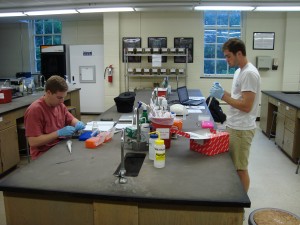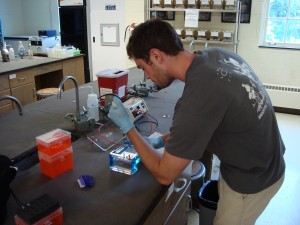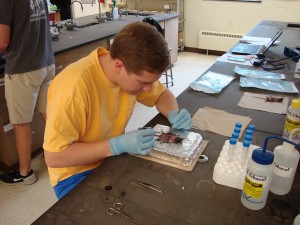This summer two H-SC students, Jefferson Thompson ’16 and Travis Goodloe 16′, are conducting melanoma research in the laboratory of Associate Professor of Biology Dr. Kristian M. Hargadon ’01. In addition to support from the College’s Honors Council and a Commonwealth Health Research Board grant to Dr. Hargadon, both students have also received external funding for their work. Travis Goodloe received a Sigma Xi Grant-in-Aid of Research for a project entitled “Validation of a Quantitative Polymerase Chain Reaction (qPCR)-based Method for Detecting Lymph Node Metastasis by Melanoma Cells.” He is developing an assay to measure the spread of regional melanomas into tumor-draining lymph nodes, and this work will serve as a foundation for future studies that aim to investigate how lymph node involvement by melanoma cells impacts the induction of immune responses to this tumor. Jefferson Thompson received a Virginia Foundation for Independent Colleges Undergraduate Science Research Fellowship for a project entitled “Generation of a Foxc2 Gene Knockout Murine Melanoma Cell Line via CRISPR-Cas9 Genome Editing Technology.” CRISPR-Cas9 gene editing has revolutionized the field of genetic engineering since its discovery in 2013, and Jefferson is the first student to employ this technology at Hampden-Sydney College. He will be editing the nucleotide sequence of the Foxc2 gene in a mouse melanoma cell line so that the protein encoded by this gene is no longer produced. This “knockout” cell line will be used in future studies to investigate the role of the FOXC2 transcription factor in regulating melanoma metastasis, and those studies will utilize the metastasis assay being developed by Travis. If the FOXC2 protein is shown to promote melanoma spread to lymph nodes, it may serve as both a clinical marker for the progression of this cancer as well as a novel therapeutic target for cancer treatments designed to eradicate metastatic melanoma. Both Jefferson and Travis plan to attend medical school upon their graduation from H-SC!
Biology Department
individually tailored preparation for graduate and professional work



